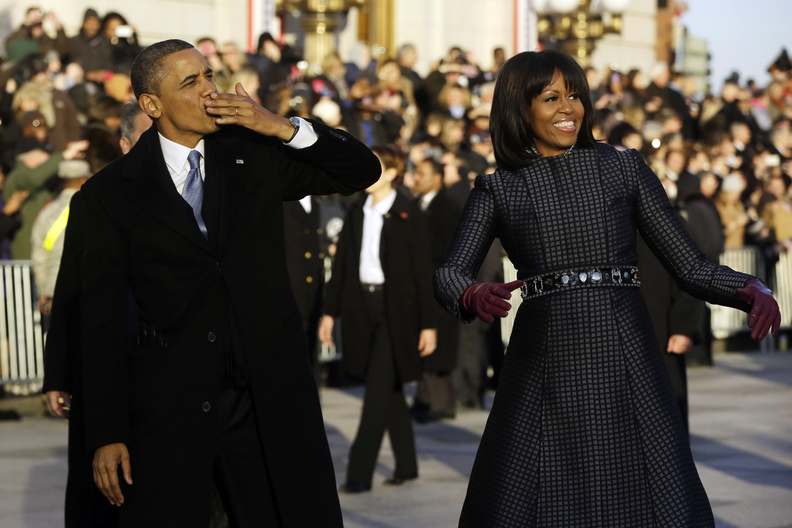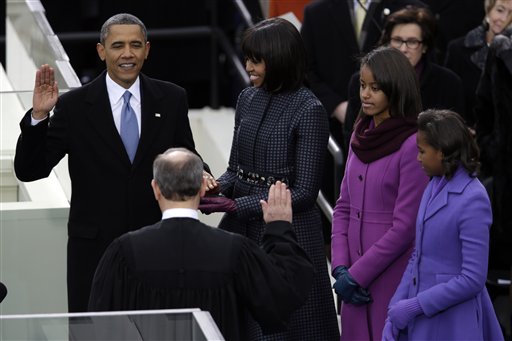WASHINGTON – A self-assured President Obama used his second inaugural address Monday to lay out a bold liberal vision of the American future, drawing direct links between the origins of the republic and some of the most vexing political issues of the day.
The usual inauguration choreography of prayers and poems and crowds became a powerful demonstration of history’s arc: The first African-American president was taking his second oath of office on a day named for the Rev. Martin Luther King Jr. on the Mall where King thundered almost 50 years ago about the United States’ unfulfilled promise.
On a day when the president was at times confident and wistful, solemn and jubilant, he called on the American people to join him in creating a new nation grounded in old ideas of equality and opportunity.
“What makes us exceptional, what makes us America, is our allegiance to an idea articulated in a declaration made more than two centuries ago,” Obama said. “We hold these truths to be self-evident, that all men are created equal.” He linked the struggle for civil rights and women’s suffrage to the debate over same-sex marriage, and promised to reform immigration legislation and fight climate change.
Obama has never lacked for confidence, but rarely has that attribute been on display as clearly as on Monday.
This was not the politician who campaigned in 2008 on themes of transcending the divisive politics of the past, though there were ritual calls for the country and its leaders to seize this moment together. Instead, it was a president who has accepted the reality of those divisions and is determined to prevail on his terms.
“We cannot mistake absolutism for principle, or substitute spectacle for politics, or treat name-calling as reasoned debate. We must act, knowing that our work will be imperfect,” Obama said to a throng bundled against the cold weather in scarves and hats.
His first campaign was aspirational, and he came to office believing, or at least hoping, that through force of personality he could gently guide the opposing sides to consensus on issues that had long resisted resolution. Monday’s speech conveyed the ambitions of a president who now believes that a different style of leadership is required.
In his speech, Obama set out his priorities for a second term, goals that will cheer the liberal wing of the Democratic Party and probably alarm many on the political right. He challenged Republicans to meet him partway, though not exactly in the middle. The question is whether he will be any more successful in his second term than he was in his first.
There are reasons for the president setting a different tone in his second inaugural than in his first. Two years after he and his party took a beating in the midterm elections, he now holds the strongest hand in Washington. His approval ratings have climbed above 50 percent, while his Republican opponents in Congress remain mired in disapproval ratings almost three times as high as their approval ratings.
Obama’s second inaugural address also reflected a changing America and the coalition that re-elected him to office. The nation’s first African-American president leads an ever-more diverse population and a country in which attitudes and mores continue to change, particularly among the youngest in society.
The policy agenda he put forth, and the values he enunciated, spoke directly to that coalition. Never before has a president used an inaugural address to speak so openly about the cause of gay rights, linking the gay rights movement with Selma and civil rights and the 1839 Seneca Falls Convention and women’s rights.
Obama became the first president to use the word “gay” in his inaugural address.
He talked of the Stonewall uprising, 1969 riots in New York City that were considered the spark that created the modern gay-rights movement. The Stonewall Inn was a bar made famous by a police raid.
“Our journey is not complete until our gay brothers and sisters are treated like anyone else under the law,” Obama said. “For if we are truly created equal, then surely the love we commit to one another must be equal as well.”
Not all Americans agree with these changes, and as president, Obama must attempt to speak for them and to them. But his remarks Monday suggest that he believes history is on his side on these issues.
Latinos, a key part of Obama’s electoral coalition, also occupied historic roles on the program. Supreme Court Justice Sonia Sotomayor, the daughter of Puerto Rican parents, administered the oath to Vice President Joe Biden.
Richard Blanco of Bethel, Maine, the son of Cuban exiles, read the inaugural poem. Both were the first Latinos to perform either duty, and Blanco also was the first gay person in his role.
Obama once hoped that he could overcome the united opposition of congressional Republicans — whose militant House members set the party’s tone during the battles of the past two years — through negotiation with GOP leaders. Now he is looking to the country to pressure his opponents to compromise in ways that they would not during his first term.
Republicans have already tested the re-elected president and discovered the limits of their power. Their decision not to pick a fight — for now — over the debt ceiling signaled their recognition of that reality.
Republicans will have to choose their battles more carefully, and they may prevail in some cases. Obama knows that he won’t get all he wants, but the balance of power at the start of his second term is far different from what it was 24 months ago.
The year ahead promises more debates over the size and scope of government, issues that dominated the past two years in Washington. Obama said the government must play a bigger role in ensuring that the middle class benefits from the nation’s economic growth, after many years when middle-class wages stagnated. He argued that the country needs better railroads and highways to make it more attractive to businesses, and better schools and colleges to train students for the jobs of the future — which often demand math and science skills.
And amid calls to impose discipline on the federal budget, he defended the value of a costly social safety net, describing it as a critical support for Americans willing “to take the risks that make this country great.”
During the campaign, Obama talked about the philosophical divide between Republicans and Democrats on these issues, as he condemned the broken politics of Washington. He said the American people could break the tie with the election.
But the election returned a majority of Republicans to the House, and on Monday the president seemed to suggest that there were grounds for compromise.
“Progress,” he said, “does not compel us to settle centuries-long debates about the role of government for all time, but it does require us to act in our time.”
The president’s second inaugural address was notable also for what he talked about only in brief. Four years ago, he stood on the Capitol’s West Front with the country facing an economic crisis. Output was falling, the stock market had plunged, many Americans were threatened with housing foreclosures, and unemployment was rising rapidly. He talked about “a sapping of confidence across our land.”
On Monday, he touched only lightly on that crisis and spoke of the economy in positive terms. “An economic recovery has begun,” he said.
As Obama spoke, a flag-waving crowd spilled down the Mall toward the Washington Monument. Their numbers appeared smaller than in 2009, when 1 million or more people watched Obama’s first swearing-in. The best measure of the difference may have been ridership on Metro: As of 4 p.m., about 538,000 rides had been taken. At the same time four years ago, there had been 807,000.
Obama and Biden were, technically, on day two of their second term. Both had taken their oaths of office in private ceremonies on Sunday, to meet the constitutional date of Jan. 20.
On Monday, Obama’s day began with a motorcade ride to the opposite side of Lafayette Park for a service at St. John’s Episcopal Church.
After a slow motorcade ride along Pennsylvania Avenue, the inaugural ceremonies began. There were appearances by pop-culture icons, both old and new: James Taylor sang “America the Beautiful,” Kelly Clarkson sang “My Country, ‘Tis of Thee” and Beyonce sang the national anthem.
Opponents will find much to dislike about what Obama said Monday, for this was not a speech aimed at mollifying those who lost the election. Sen. John McCain, R-Ariz., who lost the presidential race four years ago, expressed disappointment that Obama was not more explicit about bringing the two sides together.
“I would have liked to have seen more on outreach and working together,” McCain said. But “it’s his privilege to say what he wants.”
Send questions/comments to the editors.




